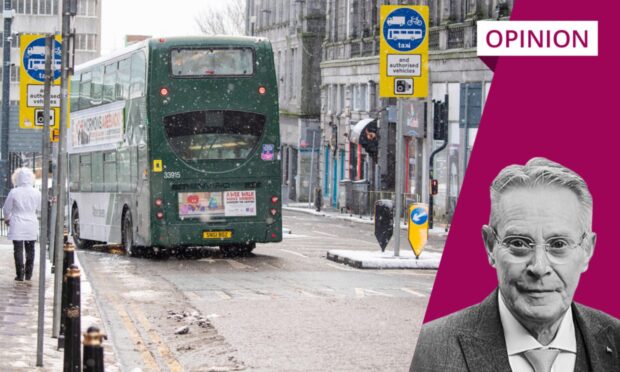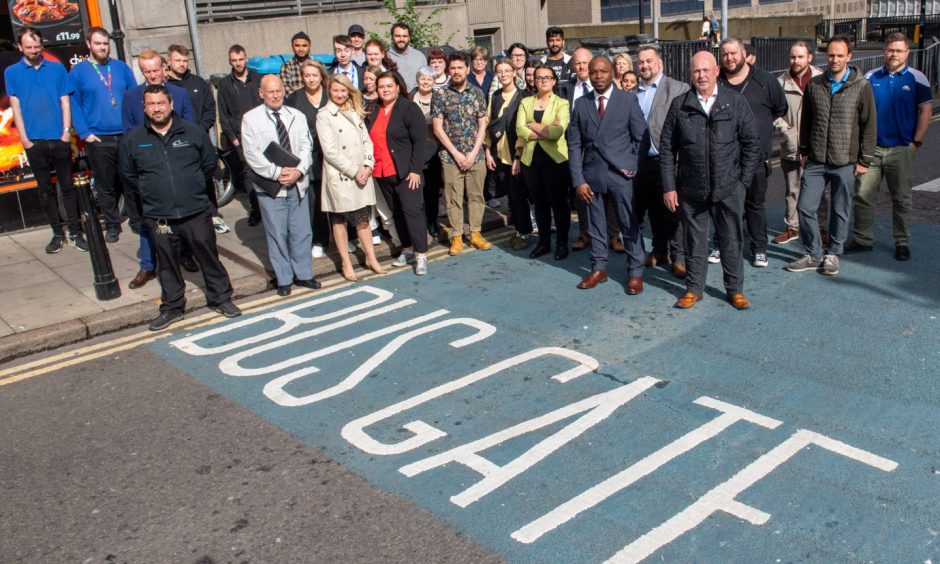For a while I was struggling to figure it all out, but then it became as clear as the “ding-ding” on a bus to tell the driver to stop.
Or is it one ding? I can’t remember. Anyway, it doesn’t matter.
Trouble is, it’s all been a “ding-dong” instead of ding-ding over Aberdeen’s bus-gate farce.
Suddenly, I discovered that a lawyer who is an expert on planning rules was agreeing with something I had first raised months ago.
Through all the city council’s mumbo jumbo over defending the hated gates, one thing shone clear to me. That the whole thing appeared legally unsound. A court challenge brought by businesses now seems inevitable.
Surely even at this late stage, there is time to park the political bus and seek a compromise.
There is a toxic mix of desperation among traders, unfortunate perceptions of stubborn big egos dominating small-time politics and a dubious legal minefield around the gates.
A light bulb went off for me on the road to Damascus – or rather Inverness in this case.
I think it was last summer when I first wrote about uncanny similarities between the twin shambles created by councillors in Aberdeen and Inverness over traffic-control projects.
Inverness eventually ran up a white flag over their own controversial “road crash”: finally realising the game was up and abandoning it.
Surprise, surprise – a plan to ban cars (customers, that is) venturing into a traditional trading zone in Inverness, which caused business apoplexy.
A legal challenge followed and the council was forced into a humiliating capitulation by a judge over deficiencies in public consultation.
Aberdeen bus gates punish its citizens with fines
This tale of two cities highlights serious underlying themes about defending local democracy and the public voice.
Aberdeen seems to have fallen into the same trap by introducing a series of bus gates to ban cars and punish its citizens with fines.
A legal hot-shot helped Inverness businesses defeat their council.
I suggested at the time that campaigners seeking a commonsense compromise over bus gates in Aberdeen might find inspiration in this.
Now the same lawyer has been consulted about a similar legal challenge to Aberdeen City Council.
I’ve always had deep reservations about obscure experimental traffic orders which enabled Aberdeen City Council to launch the gates while dodging full public consultation in advance, and then make them permanent.
A coup de grace, some might say.
They sounded better suited to low-level activity such as adjusting traffic lights at a junction than cataclysmic orders to ban private traffic from key routes, thereby disrupting the city’s commercial rhythm.
I’ve always questioned this as an inappropriate use of power and possibly legally unsound.
The crowd-funding appeal is an acid test for public support
I think the lawyer was essentially saying the same thing.
Business leaders in Aberdeen are organising a crowd-funding appeal for a court fight similar to Inverness.
This is an acid test for public support.
Put your money where your mouth is or live with the consequences.
A Commonsense Compromise campaign launched with P&J backing to find a solution to the bus gate crisis attracted 11,000 signatures by the time it was rejected at an emergency council meeting.
If each person now chipped in just a few pounds that would match the fighting fund target.
I recall someone writing to the P&J questioning whether the petition was a bit underwhelming given the combined population of Aberdeen and its commuter belt.
But from my view of similar protests, I reckon for every one person who signs a petition about something of great public concern at least another 10 would agree without actually signing themselves.
That would perhaps put a different complexion on the true scale of public disquiet, especially when affected businesses and employees are included.
Further evidence of the scale of the damage is reflected by plummeting sales figures among city traders.
Bitter recriminations and accusations reverberating around the city council chamber do the city’s image no good, nor does an “us and them” bunker mentality towards public criticism.
It will fester until the council’s actions are tested in front of a judge.
It’s not a punishment on councillors trying to do their best, but the only healthy option to clear the air and move on.
It’s a fate worse than death for politicians to admit they were wrong.
But there’s still time for the council to sit around a table for peace talks to find a compromise.
However, I fear the council has already tied itself in a legal straitjacket; another fundamental issue worthy of independent judicial scrutiny.
The clock is now counting down to the next local council elections when judgment will be passed on this administration by the public; some might even do a Trump and say it’s the worst in modern times.
What goes around comes around, as they say – but not if you’re stuck in a bus gate.
David Knight is the long-serving former deputy editor of The Press and Journal


Conversation